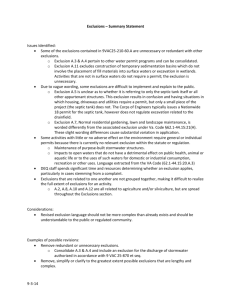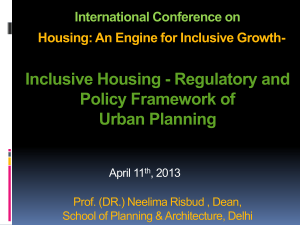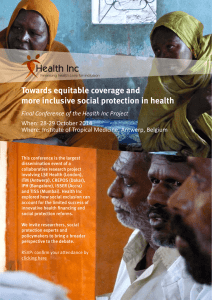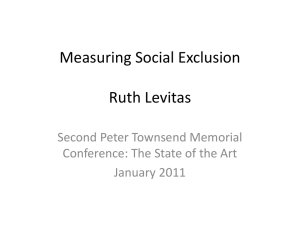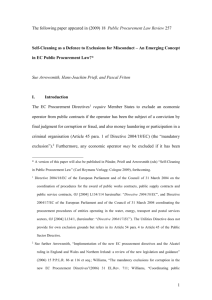School exclusions, a summary for parents
advertisement
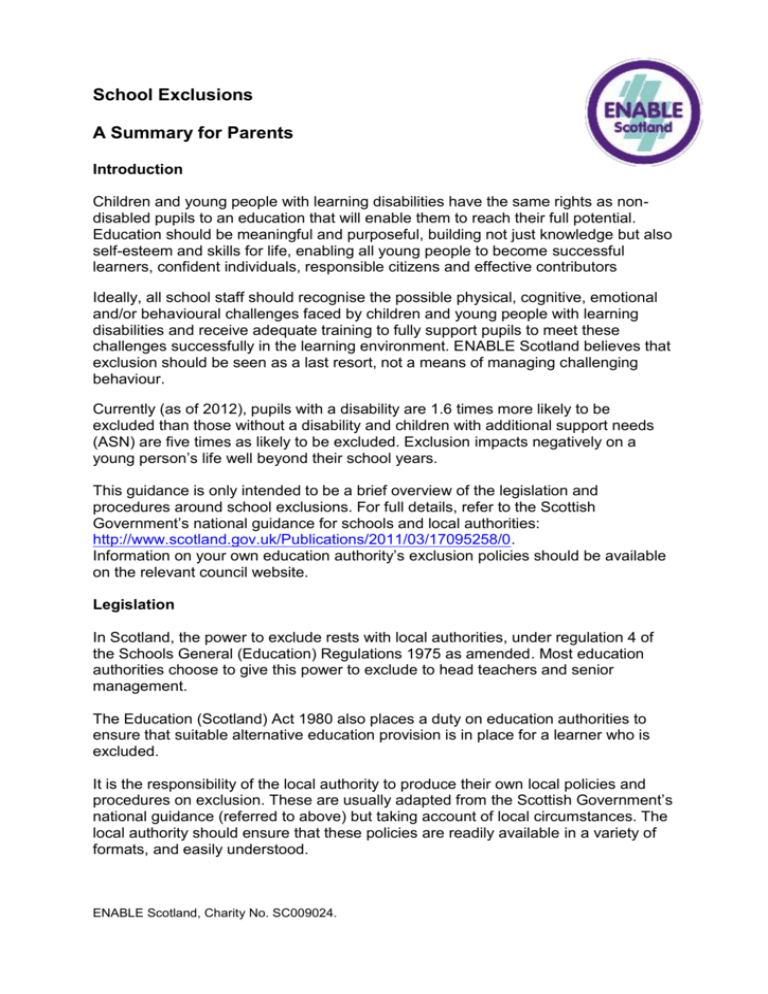
School Exclusions A Summary for Parents Introduction Children and young people with learning disabilities have the same rights as nondisabled pupils to an education that will enable them to reach their full potential. Education should be meaningful and purposeful, building not just knowledge but also self-esteem and skills for life, enabling all young people to become successful learners, confident individuals, responsible citizens and effective contributors Ideally, all school staff should recognise the possible physical, cognitive, emotional and/or behavioural challenges faced by children and young people with learning disabilities and receive adequate training to fully support pupils to meet these challenges successfully in the learning environment. ENABLE Scotland believes that exclusion should be seen as a last resort, not a means of managing challenging behaviour. Currently (as of 2012), pupils with a disability are 1.6 times more likely to be excluded than those without a disability and children with additional support needs (ASN) are five times as likely to be excluded. Exclusion impacts negatively on a young person’s life well beyond their school years. This guidance is only intended to be a brief overview of the legislation and procedures around school exclusions. For full details, refer to the Scottish Government’s national guidance for schools and local authorities: http://www.scotland.gov.uk/Publications/2011/03/17095258/0. Information on your own education authority’s exclusion policies should be available on the relevant council website. Legislation In Scotland, the power to exclude rests with local authorities, under regulation 4 of the Schools General (Education) Regulations 1975 as amended. Most education authorities choose to give this power to exclude to head teachers and senior management. The Education (Scotland) Act 1980 also places a duty on education authorities to ensure that suitable alternative education provision is in place for a learner who is excluded. It is the responsibility of the local authority to produce their own local policies and procedures on exclusion. These are usually adapted from the Scottish Government’s national guidance (referred to above) but taking account of local circumstances. The local authority should ensure that these policies are readily available in a variety of formats, and easily understood. ENABLE Scotland, Charity No. SC009024. In any exclusions procedure, the views of the learner and those of their parent(s) must be taken into account. Education authorities must also consider the facts and circumstances surrounding the incident leading to the potential exclusion. Procedures The learner’s parent(s) or the learner (if 16 or over) must be informed in writing or orally of the decision to exclude, on the same day that the decision is made. At the same time, a meeting must be arranged to discuss the exclusion within 7 days of the decision. The length of exclusion depends on the individual circumstances and is decided by the education authority, but must take into account all circumstances. However long the exclusion period, alternative education provision and, where necessary, additional support as required must be provided. Exclusions, and any appeals decisions, must be recorded. However where there is a successful appeal exclusion, the record would not be disclosed to a third party. Parents and young people aged 16 and over (and children over the age of 12 who are deemed to have legal capacity) have the right to appeal against exclusions decisions. In the first instance they would appeal to an education appeal committee set up by the education authority. Further appeals against the decision of an education appeal committee would be heard by the sheriff court. (See below for grounds of appeal to the Additional Support Needs Tribunal in cases involving disability discrimination.) Sending a child home without parental consent and recording this as an exclusion (commonly referred to as a cooling off period) is unlawful and may leave the local authority open to legal challenge by either the parent or the young person. Alternatively a section 70 complaint can be made to Scottish ministers. (See relevant section of the Toolkit for guidance on how and when to make a section 70 complaint.) Cooling-off periods (usually half a day) in themselves are not unlawful and can be used productively as part of an agreed plan with parents, but should be formally recorded as exclusions and carefully monitored. Exclusion of learners with additional support needs (ASN) or disability Where a child or young person with ASN and/or disability is at risk of exclusion, the education authority must take all reasonable steps to ensure that appropriate provision can be made to meet the learner’s additional support needs during the period of exclusion. A local authority must continue to provide additional support as required, under the terms of the Education (Additional Support for Learning) (Scotland) Act. For example if a learner has been assessed as requiring support from a Speech and Language Therapist, this should continue. Where a child has a disability as defined by the Equality Act 2010 - a physical or mental impairment that has a substantial and long-term adverse effect on his/her ability to carry out normal functions - schools must not discriminate against a learner by excluding them because of their disability or for behaviour arising as a ENABLE Scotland, Charity No. SC009024. consequence of their disability. More detailed guidance on education and exclusion can be found on the Equality and Human Rights Commission website here: http://www.equalityhumanrights.com/advice-and-guidance/education-providersschools-guidance/exclusion-from-school/ The powers of the Additional Support Needs Tribunal Scotland have been extended to include cases related to discrimination in education, including exclusions for reasons directly related to their disability. Further information can be found on their website here: http://www.asntscotland.gov.uk/asnts/935.html For advice on all matters relating to additional support for learning, contact Enquire. Helpline: 0845 123 2303 Email: info@enquire.org.uk Website: www.enquire.org.uk For legal advice on exclusions, contact Govan Law Centre’s Education Law Unit. Tel: 0141 445 1955 Email: equality@edlaw.org.uk Website: www.edlaw.org.uk ENABLE Scotland, Charity No. SC009024.
